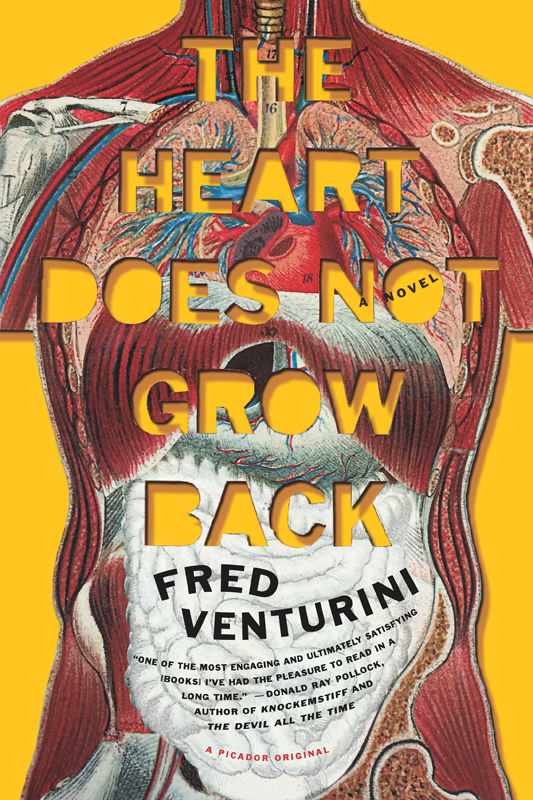
The Heart Does Not Grow Back
A Novel
کتاب های مرتبط
- اطلاعات
- نقد و بررسی
- دیدگاه کاربران
نقد و بررسی

September 8, 2014
Dale Sampson, the narrator of Venturini’s debut, is an awkward, smalltown Illinois teen obsessed with Regina, a popular girl who is out of his league. Despite the urging of his best friend, local baseball star Mack, Dale won’t let go of his infatuation. But when Dale is critically injured defending Regina from her sadistic boyfriend, Clint, Dale learns he has an ability far beyond the average teen: his limbs and organs regenerate. What follows is Dale’s years-long struggle to cope both with the loss of Regina, who was killed in Clint’s attack, and with the responsibility he feels regarding his newfound power. Venturini’s novel pleases with some standard superhero-origin fare—academic teen turned extraordinary, the local high school caste system, star-crossed first love. The story struggles from there. Dale has fittingly evil opposition in a local drug dealer and the government agent who, predictably, wishes to turn Dale into a lab rat at Research Triangle Park. Dale’s social awkwardness, however, is his biggest hurdle—and that anticlimatic psychological struggle leaves the narrative voice sounding misanthropic in spots.

September 1, 2014
A Midwestern teenager learns that having a superpower isn't all it's cracked up to be. It's a testament to this novel's unusual pull that it keeps the reader engaged despite its deeply disturbing imagery and much bloodshed. This is a fairly drastic reworking of Venturini's 2010 indie novel The Samaritan, complete with a new ending. In the first act, we meet an awkward adolescent named Dale Sampson and his athletic best friend, Mack Tucker. They're on the verge of graduating from the hell that is high school when Dale's attraction to classmate Regina Carpenter earns him the wrath of her sadistic boyfriend, Clint, who ultimately slays her, three others and himself. While recovering from his wounds, Dale learns that he can regenerate his own limbs and organs. In a slow second act, we see Dale suffering from survivor's guilt, figuring out the limits of his new abilities and indulging his savior syndrome by trying to help Regina's twin sister, Raeanna, escape from an abusive marriage. In the third act, Mack brings Dale with him to California, where he's become a B-list reality show star. Dale pitches his so-called superpower to the networks as a reality show called "The Samaritan," in which Dale donates his disposable organs to needy recipients. As he gives freely of kidneys, skin, bone marrow and even eyes, the world becomes increasingly fascinated with his abilities, even as Dale becomes increasingly more cynical. "Whatever is inside of me only seems to wake up when I get cut or beat on," he tells a sympathetic doctor. "If that's hope, hope can go fuck itself." Make no bones about it, this is a grotesque tale punctuated by its brutal yet casual violence. However, it also offers a realistic portrayal of male friendships, a black comedy about the nature of the human body and, remarkably enough, a cathartic sort of redemption. A curious story whose protagonist strongly resembles the antiheroes of comics writer Mark Millar (Kick-Ass, 2008, etc.).
COPYRIGHT(2014) Kirkus Reviews, ALL RIGHTS RESERVED.

Starred review from September 15, 2014
Dale Sampson has a superpower. His body has the ability to regenerate, a fact he discovers when his hand is virtually destroyed by a gunshot wound, and to his astonishment, his fingers grow back. Unfortunately, his memories, like his flesh, can't be destroyed, and he can't shake the memory of Regina, the girl he loved who was murdered by the same disaffected teen who had wounded him. Things become complicated when, several years later, he encounters Regina's identical twin sister, Raeanne, and is immediately smitten with her. But she's married and a future with her seems impossible, so with nothing to lose, Dale and his best friend, Mack, head to Hollywood, where Dale becomes the star of the successful reality TV show The Samaritan. Its premise: each week Dale donates an organ to a worthy recipient. Does this make him happy? Not at all. There was no silver lining I couldn't strip away to find the darkness within, he thinks bleakly. Overwhelmed by memories and regrets, Dale seems, Hamlet-like, to be unable to act, until his love for Raeanne offers him an opportunity to seize the moment and make a soul-saving sacrifice. Venturini's melancholy but fascinating first novel is an invitation to think about altruism, ethics, and the tangled precincts of the human heart.(Reprinted with permission of Booklist, copyright 2014, American Library Association.)

























دیدگاه کاربران